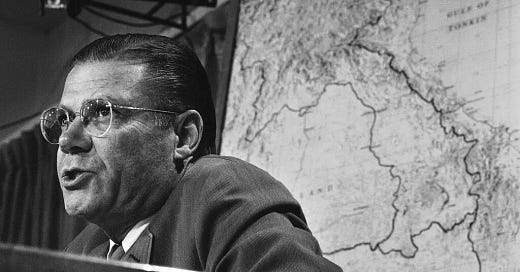Daniel Ellsberg death and legacy, Exposed government lies leading to escalation of Vietnam War, Pentagon Papers
Daniel Ellsberg death and legacy, Exposed government lies leading to escalation of Vietnam War, Pentagon Papers
From the BBC.
“Daniel Ellsberg: Pentagon Papers whistleblower dies aged 92
Daniel Ellsberg, the whistleblower who exposed the extent of US involvement in the Vietnam War, has died, aged 92.
He died at his home in Kensington, California, of pancreatic cancer, his family said.
The former US military analyst's 1971 Pentagon Papers leak led to him being dubbed "the most dangerous man in America".
It led to a Supreme Court case as the Nixon administration tried to block publication in the New York Times.
But espionage charges against Ellsberg were ultimately dismissed. "Daniel was a seeker of truth and a patriotic truth-teller, an anti-war activist, a beloved husband, father, grandfather, and great-grandfather, a dear friend to many, and an inspiration to countless more. He will be dearly missed by all of us," Ellsberg's family said in a statement obtained by NPR.
For decades, Ellsberg was a tireless critic of government overreach and military interventions.
His opposition crystallised during the 1960s, when he advised the White House on nuclear strategy and assessed the Vietnam War for the Department of Defense.
What Ellsberg learned during that period weighed heavily on his conscience. If only the public knew, he thought, political pressure to end the war might prove irresistible.
The release of the Pentagon Papers - 7,000 government pages that exposed deceptions by multiple US presidents - was a product of that rationale.
The papers contradicted the government's public statements on the war and the damning revelations they contained helped bring an end to the conflict and, ultimately, sowed the seeds of President Richard M Nixon's downfall.
Ellsberg was "the grandfather of whistleblowers", the former chief editor of The Guardian newspaper, Alan Rusbridger, told the BBC.
His intervention "radically changed the public opinion in the Vietnam War", Rusbridger said on Radio 4's World Tonight programme. The case against him set a precedent and "no US government has ever tried to injunct a paper on grounds of national security since", he said.
The Pentagon Papers created a First Amendment clash between the Nixon administration and The New York Times, which first published stories based on the papers - cast by government officials as an act of espionage that compromised national security. The US Supreme Court ruled in favour of the freedom of the press.
Ellsberg was charged in federal court in Los Angeles in 1971 with theft, espionage, conspiracy and other counts.
But before the jury could reach a verdict the judge threw out the case citing serious government misconduct, including illegal wiretapping.
The judge said that in the middle of the case he had been offered the job of FBI director by one of President Nixon's top aides.
It also emerged that there had been a government-sanctioned burglary of Ellsberg's psychiatrist's office.
Ellsberg was born in Chicago on 7 April 1931, and grew up in the suburbs of Detroit, Michigan. Before reaching the Pentagon, he was a Marine Corps veteran with a Harvard doctorate who had worked for the Defense and State departments.
From The NY Times.
“The Secrets and Lies of the Vietnam War, Exposed in One Epic Document
With the Pentagon Papers revelations, the U.S. public’s trust in the government was forever diminished.
Brandishing a captured Chinese machine gun, Secretary of Defense Robert S. McNamara appeared at a televised news conference in the spring of 1965. The United States had just sent its first combat troops to South Vietnam, and the new push, he boasted, was further wearing down the beleaguered Vietcong.
“In the past four and one-half years, the Vietcong, the Communists, have lost 89,000 men,” he said. “You can see the heavy drain.”
That was a lie. From confidential reports, McNamara knew the situation was “bad and deteriorating” in the South. “The VC have the initiative,” the information said. “Defeatism is gaining among the rural population, somewhat in the cities, and even among the soldiers.”
Lies like McNamara’s were the rule, not the exception, throughout America’s involvement in Vietnam. The lies were repeated to the public, to Congress, in closed-door hearings, in speeches and to the press. The real story might have remained unknown if, in 1967, McNamara had not commissioned a secret history based on classified documents — which came to be known as the Pentagon Papers.”



